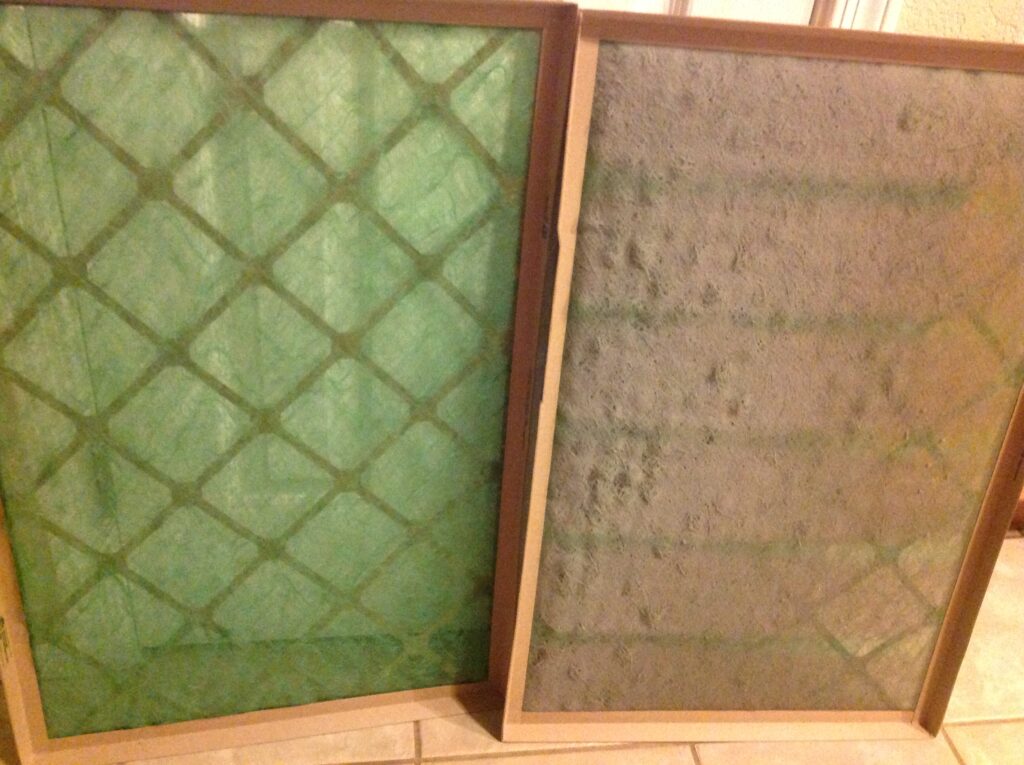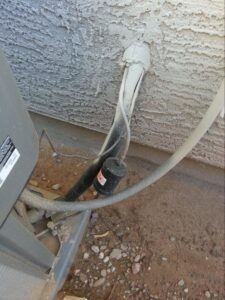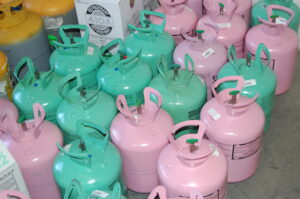How Do I Know If My Heat Pump Needs Freon?
November 11, 2024

Is your heat pump not cooling or heating your home well? It may need Freon.
Freon (refrigerant) is the lifeblood of your heat pump. Without it, your heat pump can’t cool or heat your home to your desired temperature.
If your heat pump is low on refrigerant, you’ll notice signs such as:
- Uneven temperatures in your home
- Ice on the heat pump
- Water around the indoor unit
- A hissing or bubbling noise
Do these issues sound familiar? If so, you’ll need to contact a professional to measure the refrigerant levels in your heat pump and repair the underlying problem.
In this blog, we’ll explain each of the signs above in more detail. We’ll also explain what causes low Freon levels in the first place and why a professional needs to repair the problem.
Let’s start by taking a look at the signs your heat pump is low on Freon.
Note: Freon is the brand name of a specific refrigerant type used in older heat pumps. Most people use the name Freon to refer to refrigerants in general. In this article, we’ll use the terms “Freon” and “refrigerant” interchangeably.
Signs Your Heat Pump Is Low on Freon:
Uneven temperatures in your home
We mentioned earlier that refrigerant is essential to your heat pump’s performance. If your heat pump is low on Freon, it will struggle to heat or cool your home to the set temperature on the thermostat. As a result, your heat pump may run longer, and you may notice temperature fluctuations or hot/cold spots in your house.
That said, other problems besides low refrigerant could also cause uneven temperatures in your home. One of the most common issues that lead to uneven temperatures is a dirty air filter. Before you call a professional, we recommend that you check your air filter first. That way, you can save yourself a service call if the filter turns out to be the problem.
If the hot and cold spots persist after changing the dirty filter, you’ll need to call a professional to inspect the heat pump. The technician will check to see if you have a refrigerant leak and look for other problems that cause uneven temperatures.
Ice on the heat pump
In winter, it’s normal to see a little bit of ice or frost on the outdoor unit of your heat pump. Your heat pump has a natural defrost cycle that melts the frost or ice, so you shouldn’t see ice on your heat pump for longer than 30 minutes or so.

However, if you notice persistent ice buildup in winter or any ice on the outdoor unit in summer, your heat pump may be low on refrigerant. Low refrigerant levels cause the internal pressure of your system to drop, which in turn lowers the temperature of the refrigerant. Eventually, the refrigerant can get so cold that it causes ice to form on your heat pump.
The most common place to see ice buildup is on the copper refrigerant lines that connect to the outdoor unit (pictured below). You may also see ice on the outdoor unit itself. Either way, you should contact a professional to check your refrigerant levels—especially if the ice accompanies some of the other signs mentioned in this article.
Refrigerant lines connecting to the outdoor unit
Water around the indoor unit
Do you see a pool of water around the indoor unit of your heat pump?
If so, your heat pump could be low on refrigerant. Like we mentioned above, low refrigerant levels can lead to ice buildup. When the ice melts, you may see a pool of water around the indoor unit.
A professional should inspect the heat pump to determine the cause of the leaking water.
Learn more about what issues cause your AC/heat pump to leak water by reading our blog, “Why is My Air Conditioner Leaking Water? An NJ Tech Answers.”
A hissing or bubbling noise
You probably have a refrigerant leak if you hear a hissing or bubbling sound coming from your heat pump. A hissing sound means the refrigerant is escaping from your system as a gas, and a bubbling sound means it’s leaking as a liquid.
Either way, a professional will need to repair the leak and add more refrigerant to your heat pump. We’ll explain more about this below.
What Causes Low Freon Levels in a Heat Pump?
Your heat pump doesn’t consume refrigerant like a car consumes gas. Instead, the heat pump reuses the same refrigerant over and over again as it warms or cools your home.
If your heat pump is low on refrigerant, it means there’s a leak somewhere. Refrigerant leaks can form in the indoor or outdoor units and the copper refrigerant lines that run between them.
You’ll need to contact a professional to find the source of the leak and repair it. After the technician fixes the leak, they will refill your system with the correct amount of refrigerant.
Why Does a Professional Need To Repair a Freon Leak?
Safely contained inside your heat pump, refrigerant poses no health risks. But when refrigerant leaks out into the open air, it can cause adverse health symptoms such as:
- Headaches
- Nausea
- Vomiting
- Coughing
- Chemical burns
Because of these nasty side effects, the Environmental Protection Agency only allows certified technicians to handle refrigerants. A certified technician can properly dispose of any spilled refrigerant and safely refill your heat pump with the proper amount.
Think Your Heat Pump Is Low on Freon? Contact Air Experts Today.

Technicians at Air Experts can seal and refill your heat pump’s Freon leak.
We’ve served New Jersey residents for over 25 years. Our highly-trained (and certified) technicians can quickly find the source of your refrigerant leak and fix it. As a locally-operated outfit, we are available for our Monmouth and Ocean County homeowners 7 days a week.
For more information about what to expect when working with us, visit our heat pump repair page.
